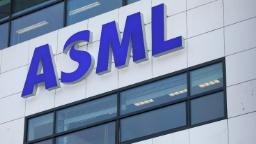
Hongkong
CNN
—
Dutch semiconductor equipment maker ASML said “rules are being finalized” on export controls amid reports that the Netherlands and Japan have joined the United States in restricting sales of some computer chip equipment to China.
“We understand that steps have been taken between the governments to reach an agreement that, we understand, will focus on advanced chip manufacturing technologies, including but not limited to advanced lithography tools,” the company said in response to questions late Friday. Time told CNN about export controls to China.
“It has to be detailed and implemented into legislation before it can go into effect, and that will take time.”
ASML is known for its prowess in making photolithography machines, which use light to print patterns on silicon wafers. This step is critical for the mass production of microchips, the company said.
The company’s response came as Bloomberg, the Wall Street Journal and the Financial Times reported over the weekend, citing anonymous sources, that the U.S. had persuaded the Netherlands and Japan to agree to restrict exports of certain chip-making equipment to China.
An agreement was reached at the White House on Friday but was not formally announced, in part because of “fears in Japan and the Netherlands of possible Chinese retaliation,” the Wall Street Journal reported, citing a person familiar with the matter.
Bloomberg reported that the deal “will extend some of the export controls imposed by the US in October” to Dutch and Japanese companies, including ASML (ASML), Nikon (NINOY) and Tokyo Electron.
The Biden administration has banned Chinese companies from purchasing advanced chips and chip manufacturing equipment without a license. It also limits the ability of U.S. citizens to provide support for chip development or production at certain Chinese manufacturing facilities.
The White House did not immediately respond to a request for comment outside U.S. business hours. Nikon and Tokyo Electron declined to comment.
Japanese Economy and Trade Minister Yasutoshi Nishimura told reporters on Saturday that he would “refrain from commenting on diplomatic negotiations”.
Asked about the three-way talks in Washington, Nishimura said “we want to respond appropriately while taking into account regulatory trends in each country.”
Because of its dominance in the market, experts see ASML as a bellwether in the growing divide between China and the West over access to advanced technology.
Lu Xiaomeng, director of geotechnology at Eurasia Group, said that in recent months, the Dutch government has faced pressure from the United States to restrict the export of chip-related products to China, especially those from ASML.
In a statement on Friday, the company said it did not expect any material impact on its 2023 financial projections based on government officials and current market conditions.
But ASML said its knowledge of the new rules was still limited, making it difficult to plan for “the financial, organizational and global industry impact of the new export control rules in the medium to long term”.
“While these rules are being finalized, ASML will continue to engage with authorities to inform them of the potential impact of any proposed rules to assess the impact on the global semiconductor supply chain,” it said.
It noted that it primarily sells “mature” products to China, where its state-of-the-art lithography technology has been restricted since 2019.
The machines were banned from being shipped to China because the Dutch government “refused to issue a license under pressure from the US,” Lu previously told CNN.
— CNN’s Emiko Jozuka contributed to this report.